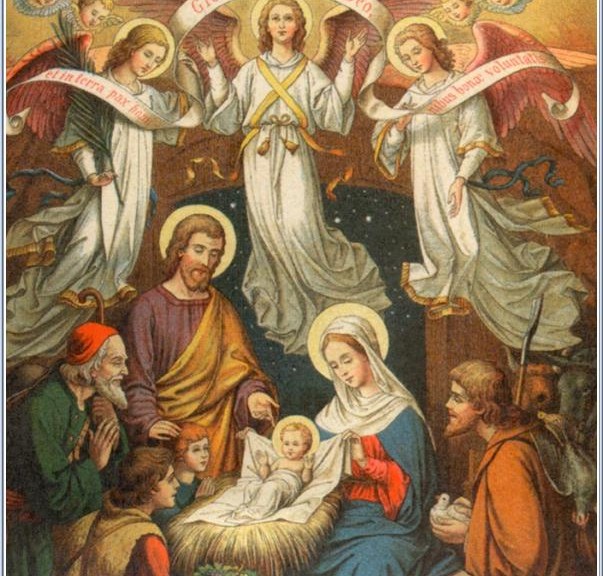Critics like to attack the book of Matthew, and they usually begin those attacks in the very first chapter.
Matthew 1:21-23 And she shall bring forth a son, and thou shalt call his name JESUS: for he shall save his people from their sins. (22) Now all this was done, that it might be fulfilled which was spoken of the Lord by the prophet, saying, (23) Behold, a virgin shall be with child, and shall bring forth a son, and they shall call his name Emmanuel, which being interpreted is, God with us.
For Christians we call these verses to mind every year, and it becomes a large bedrock of our faith. Others will say that the prophecy he is referring to doesn’t use the word virgin, nor is it speaking about the Messiah.
When I began this post I thought that I was going to just going to look at the prophecy it comes from:
Isaiah 7:14 Therefore the Lord himself shall give you a sign; Behold, a virgin shall conceive, and bear a son, and shall call his name Immanuel,
and examine the Hebrew word that the King James Bible translates as ‘virgin’ and leave it at that, but it would seem that God wouldn’t let me stop there and what began as a single article has grown into what will be probably three or four.
So without further ado, let’s pull up the word virgin in Isaiah 7:14:
H5959 עַלְמָה ‛almâh
al-maw’
Feminine of H5958; a lass (as veiled or private): – damsel, maid, virgin.
So what’s the problem? Clearly virgin is on the list of possible translations right? It is, but there is a group of Hebrew scholars that say it shouldn’t mean virgin, but rather it should be a young girl or woman. Now if that’s true, then why was it ever translated virgin? Good question. The claim is that the Septuagint (the Greek translation of the Old Testament), completed probably around the 3rd century, used the Greek word for virgin instead of young woman, and that it was the Septuagint that Matthew referenced to compose his gospel. So, they say that Christians have been using the wrong translation ever since. A point which I feel is rendered moot when you consider the Septuagint was translated by 70 or more Hebrew Scholars that didn’t have any Christian influence since it was translated 2-300 years before Jesus was born.
Where does that leave us? First if you think about it, even if the word meant young unmarried woman or maid, it would almost certainly imply she is a virgin. But let’s not just say that because Hebrew scholars will say that, if it meant virgin, it would have used the word ‘bethulah,’ which leaves us with the fact that, if you grab from Christian sources, you will find many reasons (some good and some bad) as to why the word should be ‘virgin,’ and if you grab from Jewish sources (some good and some bad) you will find a myriad of reasons why ‘almah’ doesn’t mean virgin.
For now let’s back up from the word a bit and look at the context.
Isaiah 7:10-14 Moreover the LORD spake again unto Ahaz, saying, (11) Ask thee a sign of the LORD thy God; ask it either in the depth, or in the height above. (12) But Ahaz said, I will not ask, neither will I tempt the LORD. (13) And he said, Hear ye now, O house of David; Is it a small thing for you to weary men, but will ye weary my God also? (14) Therefore the Lord himself shall give you a sign; Behold, a virgin shall conceive, and bear a son, and shall call his name Immanuel.
God tells Ahaz to ask for a sign. Ahaz refuses and God says He is going to give one anyway. Right? So think on this a moment. God says there is going to be a sign, whether Ahaz wants one or not, which must mean this sign is pretty important. It would also mean that the sign would be special. Correct? In the book of John, when God gives us a sign, He raises the dead. When He wanted to give Egypt a sign, He split the Red Sea. So here, when God wants to give a special sign, He says that a woman will give birth? I don’t know about you guys, but it doesn’t seem to me that a woman giving birth is very earth-shattering. I mean, I don’t want to make it sound that I think the miracle of birth isn’t special, but it isn’t rare. It happens every few seconds.
That being said, chapter 8 gives us the birth of Mahershalalhashbaz (which means hasten-booty speed spoil) who God names. This is probably the real reason that they used the word, almah, and not ‘bethulah,’ because the first child wasn’t born from a virgin, and that child didn’t complete everything given in the prophecy (we will cover more on this in the next post), whereas the second, Jesus of Nazareth, did.
The next segment is where things really start to get interesting because you see that “A virgin shall conceive” isn’t the prophecy, not really. It is the sign God would give so that we would know that the prophecy in Isaiah 7 was not only true, but that we would have the time frame of the whole thing. Until next time, may God bless you and keep you.







